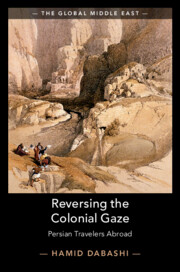Book contents
- Reversing the Colonial Gaze
- The Global Middle East
- Reversing the Colonial Gaze
- Copyright page
- Dedication
- Contents
- Figures
- Preface
- Acknowledgments
- Introduction
- 1 Mr. Shushtari Travels to India
- 2 Mirza Abu Taleb Travels from India
- 3 An Ilchi Wonders about the World
- 4 A Colonial Officer Is Turned Upside-Down
- 5 A Shirazi Shares His Travelogues
- 6 A Wandering Monarch
- 7 Hajj Sayyah Leads a Peripatetic Life
- 8 In the Company of a Refined Prince
- 9 A Wandering Mystic
- 10 In and out of a Homeland
- 11 The Fact and Fiction of a Homeland
- 12 Professor Sayyah Comes Home to Teach
- Conclusion
- Index
1 - Mr. Shushtari Travels to India
Published online by Cambridge University Press: 19 December 2019
- Reversing the Colonial Gaze
- The Global Middle East
- Reversing the Colonial Gaze
- Copyright page
- Dedication
- Contents
- Figures
- Preface
- Acknowledgments
- Introduction
- 1 Mr. Shushtari Travels to India
- 2 Mirza Abu Taleb Travels from India
- 3 An Ilchi Wonders about the World
- 4 A Colonial Officer Is Turned Upside-Down
- 5 A Shirazi Shares His Travelogues
- 6 A Wandering Monarch
- 7 Hajj Sayyah Leads a Peripatetic Life
- 8 In the Company of a Refined Prince
- 9 A Wandering Mystic
- 10 In and out of a Homeland
- 11 The Fact and Fiction of a Homeland
- 12 Professor Sayyah Comes Home to Teach
- Conclusion
- Index
Summary
In Chapter 1, “Mr. Shushtari Travels to India,” I begin with a close study of Mir Seyyed Abd al-Latif Shushtari’s Tohfat al-Alam/Gift from the World (1788). Born and raised in Shushtar in Southern Iran, Shushtari was one of the earliest travelers of this period, whose travel itineraries eventually took him to India where he became directly involved with the British colonial administration of the subcontinent. Upon his return to Iran he wrote one of the earliest accounts of Iranian encounters with European colonial modernity in India. The text is extraordinary evidence of an imaginative geography of the global south fully aware of the British and European imperial topography. What is peculiar to Shushtari’s travelogue is that he went East, not West, exactly in the opposite direction of what these travelers are believed to be destined. It is in India that he encounters the institutional impact of British (European) colonialism, for which he has both a positive appreciation and a critical stand. Shushtari, therefore, stands at a critical point in a changing world where the Ottoman, the Qajar, and the Mughal Muslim empires are beginning to yield their cosmopolitan hegemony to alternative European imperial imaginings.
Keywords
- Type
- Chapter
- Information
- Reversing the Colonial GazePersian Travelers Abroad, pp. 25 - 46Publisher: Cambridge University PressPrint publication year: 2020

